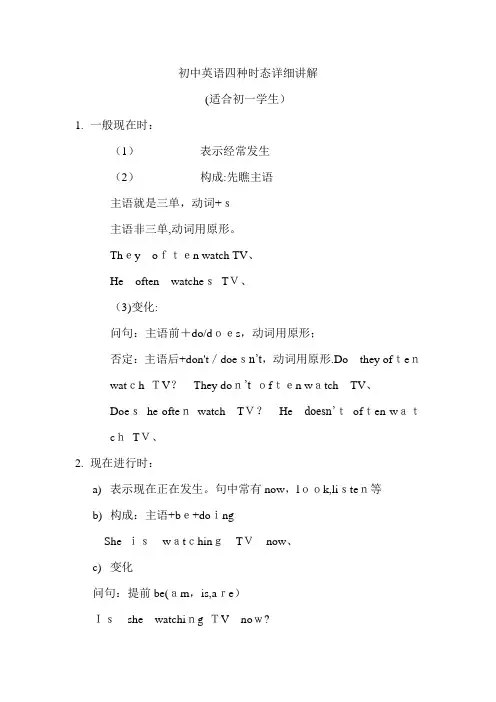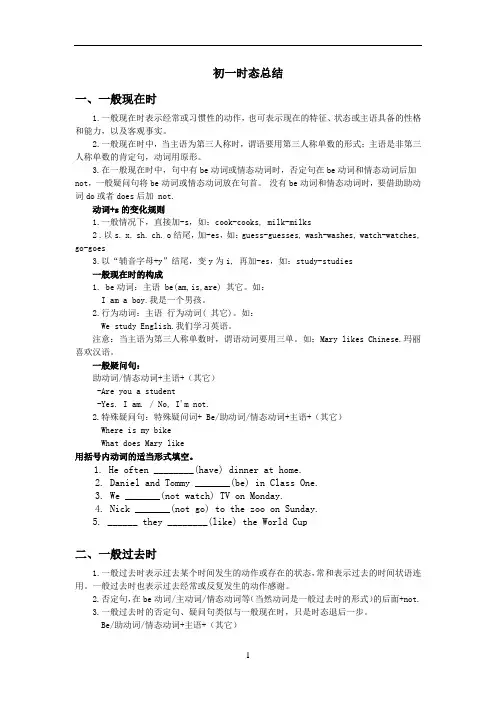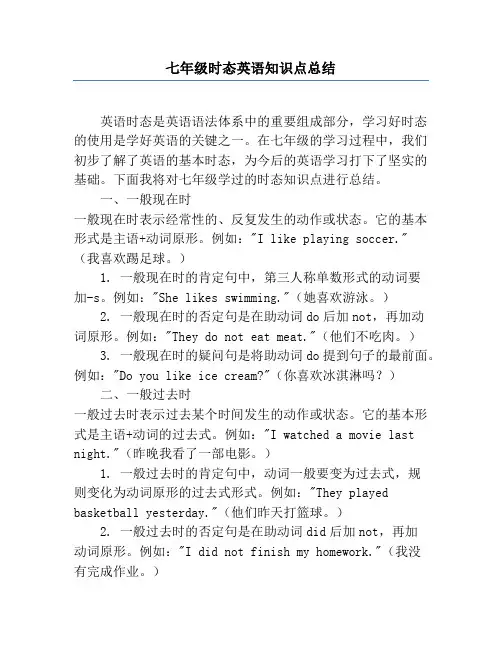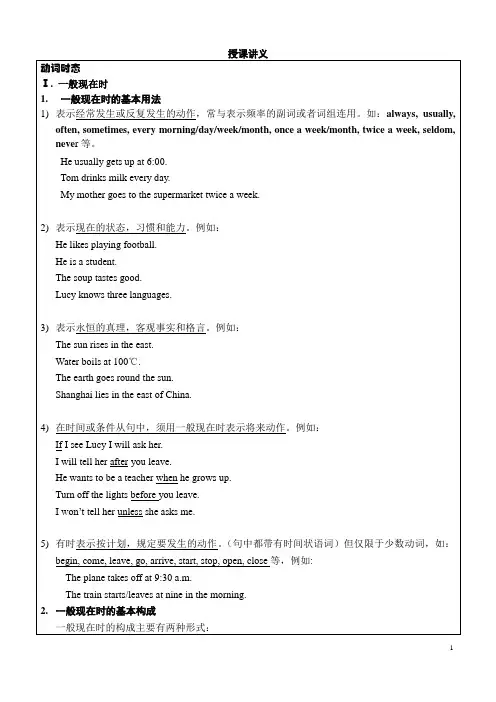初一英语四种时态讲解
初一英语四种时态讲解

初中英语四种时态详细讲解(适合初一学生)1.一般现在时:(1)表示经常发生(2)构成:先瞧主语主语就是三单,动词+s主语非三单,动词用原形。
They often watch TV、He often watchesTV、(3)变化:问句:主语前+do/does,动词用原形;否定:主语后+don't/doesn’t,动词用原形.Do they oftenwatch TV?They don’t often watch TV、Doeshe oftenwatch TV?He doesn’toften watchTV、2.现在进行时:a)表示现在正在发生。
句中常有now,look,listen等b)构成:主语+be+doingShe iswatchingTVnow、c)变化问句:提前be(am,is,are)Isshe watching TV now?否定:be后+notSheisn'twatching TV now、d)加ing得方法:一般直接+,去不发音得e加,闭音节双写+。
3.一般过去时:a)表示过去得动作或状态,句中常有yesterday,last等过去得时间。
b)构成:动作:主语+动词得过去式状态:主语+was/were(句中没实意动词)Shewatched TV last night、She was herelast night、c)变化:问句:主语前+did,动词用原形DidshewatchTV last night?Was she here lastnight?否定:主语后+didn’t,动词用原形.She didn’twatch TV lastnight、She wasn’t watch TV last night、(4)过去式:一般+ed;e结尾+d;辅音+y得,去y+ied;闭音节双写+ed;不规则得120页。
4.一般将来时:a)表示:将来,句中有表示将来得时间:tomorrow、next、soon,intwo days等b)构成A:主语+will+do(任何人称)B:主语+shall+do(仅第一人称I,we)C:主语+be going to +do 如:A:Shewillwatch TV this evening、B:Weshallwatch TV this evening、C:She is going to watch TV this evening、c)变化问句:提前will/shall/beA:Will she watch TV this…?B:ShallwewatchTV …?C:Isshe going towatch…?否定:在will/shall/be 后+notA: She won't watch TV…B:We shall notwatch…shan'tC:She isn’t going to watch…There is a meeting next week、Therewas a meetingyesterday、There will be a meeting next…=Thereisgoing tobeameeting next …。
初一英语时态总结

初一时态总结一、一般现在时1.一般现在时表示经常或习惯性的动作,也可表示现在的特征、状态或主语具备的性格和能力,以及客观事实。
2.一般现在时中,当主语为第三人称时,谓语要用第三人称单数的形式;主语是非第三人称单数的肯定句,动词用原形。
3.在一般现在时中,句中有be动词或情态动词时,否定句在be动词和情态动词后加not,一般疑问句将be动词或情态动词放在句首。
没有be动词和情态动词时,要借助助动词do或者does后加 not.动词+s的变化规则1.一般情况下,直接加-s,如:cook-cooks, milk-milks2 .以s. x. sh. ch. o结尾,加-es,如:guess-guesses, wash-washes, watch-watches, go-goes3.以“辅音字母+y”结尾,变y为i, 再加-es,如:study-studies一般现在时的构成1. be动词:主语 be(am,is,are) 其它。
如:I am a boy.我是一个男孩。
2.行为动词:主语行为动词( 其它)。
如:We study English.我们学习英语。
注意:当主语为第三人称单数时,谓语动词要用三单。
如:Mary likes Chinese.玛丽喜欢汉语。
一般疑问句:助动词/情态动词+主语+(其它)-Are you a student-Yes. I am. / No, I'm not.2.特殊疑问句:特殊疑问词+ Be/助动词/情态动词+主语+(其它)Where is my bikeWhat does Mary like用括号内动词的适当形式填空。
1. He often ________(have) dinner at home.2. Daniel and Tommy _______(be) in Class One.3. We _______(not watch) TV on Monday.4. Nick _______(not go) to the zoo on Sunday.5. ______ they ________(like) the World Cup二、一般过去时1.一般过去时表示过去某个时间发生的动作或存在的状态,常和表示过去的时间状语连用。
七年级时态英语知识点总结

七年级时态英语知识点总结英语时态是英语语法体系中的重要组成部分,学习好时态的使用是学好英语的关键之一。
在七年级的学习过程中,我们初步了解了英语的基本时态,为今后的英语学习打下了坚实的基础。
下面我将对七年级学过的时态知识点进行总结。
一、一般现在时一般现在时表示经常性的、反复发生的动作或状态。
它的基本形式是主语+动词原形。
例如:"I like playing soccer."(我喜欢踢足球。
)1. 一般现在时的肯定句中,第三人称单数形式的动词要加-s。
例如:"She likes swimming."(她喜欢游泳。
)2. 一般现在时的否定句是在助动词do后加not,再加动词原形。
例如:"They do not eat meat."(他们不吃肉。
)3. 一般现在时的疑问句是将助动词do提到句子的最前面。
例如:"Do you like ice cream?"(你喜欢冰淇淋吗?)二、一般过去时一般过去时表示过去某个时间发生的动作或状态。
它的基本形式是主语+动词的过去式。
例如:"I watched a movie last night."(昨晚我看了一部电影。
)1. 一般过去时的肯定句中,动词一般要变为过去式,规则变化为动词原形的过去式形式。
例如:"They played basketball yesterday."(他们昨天打篮球。
)2. 一般过去时的否定句是在助动词did后加not,再加动词原形。
例如:"I did not finish my homework."(我没有完成作业。
)3. 一般过去时的疑问句是将助动词did提到句子的最前面。
例如:"Did you go to the park yesterday?"(你昨天去公园了吗?)三、一般将来时一般将来时表示将要发生的动作或状态。
初中英语四个基本时态

我以为你病了呢。(这句话应是在说话之前,我以为你病了。但是现在我知道你没病)
2.一般过去时的构成
a.动词过去式的变化可速记为“直”、“去”、“双”、“改”四字诀。
一般情况下在动词原形后直接加-ed
work—worked learn—learned want—wanted
I won’t tell herunlessshe asks me.
5)有时表示按计划,规定要发生的动作。(句中都带有时间状语词)但仅限于少数动词,如:begin, come, leave, go, arrive, start, stop, open, close等,例如:
The plane takes off at 9:30 a.m.
Will you be at home at seven this evening?
2)be going to +不定式,表示将来。
a.主语的意图,即将做某事。
What are you going to do tomorrow?
b.计划,安排要发生的事。
The play is going to be produced next month。
—Are they students? —Yes, they are. /No, they aren’t.
2)实义动词型:句中的谓பைடு நூலகம்动词为实义动词:
a.肯定句中,主语(第一、二人称和复数)+动词原形+宾语
I usually get up at 7 every morning.
b.肯定句中,主语(第三人称单数she, he, it)+动词词尾要加-S +宾语
初一英语时态总结

初一英语时态总结一、一般现在时态(Simple Present Tense)1. 表示经常性或习惯性的动作、状态或真理。
例句:I often go to school by bus.(我经常坐公交车去学校。
) Water boils at 100 degrees Celsius.(水在100摄氏度时沸腾。
)2. 表示客观事实、科学真理或普遍规律。
例句:The sun rises in the east.(太阳从东方升起。
)Water freezes at 0 degrees Celsius.(水在0摄氏度时结冰。
) 3. 表示主语的特性或个人喜好。
例句:She likes playing basketball.(她喜欢打篮球。
)He is a smart boy.(他是个聪明的男孩。
)二、一般过去时态(Simple Past Tense)1. 表示过去某个时间发生的动作或状态。
例句:I went to the park yesterday.(我昨天去了公园。
) They lived in China when they were young.(他们年轻时住在中国。
)2. 表示过去的习惯或经常性动作。
例句:We used to play soccer every weekend.(我们过去每个周末都踢足球。
)She always studied until late at night.(她过去总是学习到很晚。
)3. 表示过去的真理或规律。
例句:Dinosaurs existed millions of years ago.(恐龙存在于几百万年前。
)The Earth was flat according to ancient beliefs.(根据古代的信仰,地球是平的。
)三、一般将来时态(Simple Future Tense)1. 表示将来某个时间或在某个时间之后发生的动作或状态。
例句:I will visit my grandparents next week.(下周我会去看望我的祖父母。
初一英语四大时态

Today is Saturday. Tomorrow will be Sunday. 今天是星期六。明天(将)是星期日。
He will be thirty years old this time next year. 明年这个时候他就 (将 )三十岁。
3
3、问对方是否愿意做某事或表示客气地邀请或命令。
at school just now.
2.He
at the camp last week.
3.We
students two years ago. 4.They
on the farm a moment ago.
5.Yang Ling
eleven years old last year.
6.There
lots of grapes here
live
hope
like
3.study
cry
4.stop
不规则变化:
5.do/does
ห้องสมุดไป่ตู้
see
are
is/am
eat
feel
sing
go
make
run
take
write
have/has
swim
say
find
come
sit
put
read
1
二、用动词的适当形式填空( was/were/is ) .
1.I
her homework yesterday evening.
一般疑问句:
Ann
her homework yesterday
evening?No, 对划线部分提问:
. Ann
yesterday evening?
英语四个时态的结构
英语四个时态的结构英语中有四个基本时态:一般现在时、一般过去时、一般将来时和现在进行时。
它们有不同的结构和用法,下面将详细介绍每个时态的结构。
一、一般现在时:1.肯定句结构:主语+动词原形/第三人称单数形式+其他例如:I play football every weekend.2. 否定句结构:主语 + do/does + not + 动词原形 + 其他例如:They do not like tomatoes.3. 疑问句结构:Do/Does + 主语 + 动词原形 + 其他?例如:Do you like ice cream?4. 特殊疑问句结构:特殊疑问词 + do/does + 主语 + 动词原形 + 其他?二、一般过去时:1.肯定句结构:主语+动词过去式+其他例如:She watched a movie last night.2. 否定句结构:主语 + did not + 动词原形 + 其他例如:He did not eat dinner yesterday.3. 疑问句结构:Did + 主语 + 动词原形 + 其他?例如:Did you go to the party?4. 特殊疑问句结构:特殊疑问词 + did + 主语 + 动词原形 + 其他?例如:When did you arrive?三、一般将来时:1. 肯定句结构:主语 + will + 动词原形 + 其他例如:I will visit my grandma next week.2. 否定句结构:主语 + will not + 动词原形 + 其他3. 疑问句结构:Will + 主语 + 动词原形 + 其他?例如:Will you go to the concert?4. 特殊疑问句结构:特殊疑问词 + will + 主语 + 动词原形 + 其他?例如:Where will you travel next summer?四、现在进行时:1. 肯定句结构:主语 + am/is/are + 动词-ing + 其他例如:She is watching TV now.2. 否定句结构:主语 + am/is/are + not + 动词-ing + 其他例如:They are not studying for the exam.3. 疑问句结构:Am/Is/Are + 主语 + 动词-ing + 其他?例如:Are you playing basketball?4. 特殊疑问句结构:特殊疑问词 + am/is/are + 主语 + 动词-ing + 其他?例如:What are you doing tonight?以上就是英语四个基本时态的结构和用法。
人教七年级英语考试必考四种基本时态详解及60个重点句型
初一英语考试必考四种基本时态详解1一般现在时一般现在时的用法1)经常性或习惯性的动作,常与表示频腮度的时间状语连用。
时间状语:every…, sometimes, at…, on Sunday。
例如:I leave home for school at 7 every morning. 每天早上我七点离开家。
2)客观真理,客观存在,科学事实。
例如:The earth moves around the sun. 地球绕太阳转动。
Shanghai lies in the east of China. 上海位于中国东部。
3)表示格言或警句。
例如:Pride goes before a fall. 骄者必败。
注意:此用法如果出现在宾语从句中,即使主句是过去时,从句谓语也要用一般现在时。
例:Columbus proved that the earth is round. 哥伦布证实了地球是圆的。
4)现在时刻的状态、能力、性格、个性。
例如 I don't want so much. 我不要那么多。
Ann writes good English but doesnot speak well. 安英语写得不错,讲的可不行。
练习:1. We often______(play) in the playgound.2. He _____(get) up at six o’clock.3. _____you ______(brush) your teeth every morning.What (do) ______he usually (do)______ after school?5. Danny _____(study) English, Chinese, Maths, Science and Art an school.6. Mike sometimes ________(go) to the park with his sister.7. At eight at night, she __________(watch) TV with his parents.8. ________ Mike________(read) English every day?9. How many lessons_________your classmate________(have) on Monday?10. What time_________his mother_________(do) the housework?改句子1. Do you often play football after school? (肯定回答)2. Gao Shan’s sister likes playing table tennis (改为否定句)3. She lives in a small town near New York. (改为一般疑问句)4. We have four lessons.(否定句)5. Nancy doesn’t run fast (肯定句)6. Mike has two letters for him.一般疑问句:否定句:7. I usually play football on Friday afternoon.否定句:一般疑问句:2一般过去时一般过去时的基本用法:1.通常表示过去发生的而现在已经结束的事件、动作或情况。
7年级英语时态
7年级英语时态1、一般现在时:概念:经常、反复发生的动作或行为及现在的某种状况。
时间状语:Always(总是), usually(通常), often(经常), sometimes(有时候), every week (day, year, month…), once a week, on Sundays ,etc.基本结构:当主语是第三人称单数时肯定句主语+动词单三+其他否定句主语+doesn't+动词原形+其他一般疑问句Does+主语+动词原形+其他肯定回答Yes,主语+does否定回答No,主语+doesn't当主语不是第三人称单数时肯定句主语+动词原形+其他否定句主语+don't+动词原形+其他一般疑问句Do+主语+动词原形+其他例句:I never get up early on Sundays.特殊疑问句特殊疑问词(when,where,who,how ,etc.)+一般疑问句2、一般过去时:概念:过去某个时间里发生的动作或状态;过去习惯性、经常性的动作、行为。
时间状语:ago, yesterday, the day before yesterday, last week(year, night, month…), in 1989, just now, at the age of 5, one day, long long ago, once upon a time, etc.基本结构:主语+动词过去式+其他否定形式did+not+do+其他;一般疑问句did+主语+do+其他?例句:I went to Italy .I visited museums and sat in public gardens3、现在进行时:概念:表示现阶段或说话时正在进行的动作及行为。
时间状语:now, at this time(在这一刻), these days, etc.基本结构:am/is/are+doing否定形式:am/is/are+not+doing.一般疑问句:把be动词放于句首。
初一英语时态总结
初一英语时态总结英语时态对于初学者来说是一个比较难以掌握的知识点。
在初中阶段,学生们开始接触各种不同的时态,如简单现在时、一般过去时、一般将来时等。
本文将对初一英语时态进行总结和介绍,帮助初学者更好地理解和运用时态知识。
1. 简单现在时 (Simple Present Tense)简单现在时用来表示经常性、习惯性或普遍性的动作。
一般情况下,我们只需要在动词原形后加上第三人称单数的“s”即可。
例如:He plays soccer on weekends.(他周末踢足球。
)此外,也可以使用一些表示频率的词汇,如always,often,sometimes等。
2. 一般过去时 (Simple Past Tense)一般过去时用来表示发生在过去某个时间的动作或状态。
对于大多数动词而言,其过去式形态是在动词原形后加上-ed。
例如:I watcheda movie last night.(昨晚我看了一部电影。
)然而,也有一些特殊的动词需要记忆其不规则的过去式形态,如go-went、eat-ate等。
3. 一般将来时 (Simple Future Tense)一般将来时用来表示将来某时将要发生的动作或状态。
一般情况下,我们使用will加动词原形来构成简单将来时。
例如:They will go to the park tomorrow.(他们明天将去公园。
)此外,我们也可以使用begoing to来表示预计将要进行的动作。
例如:She is going to visit her grandmother next week.(她下周将要去看她的奶奶。
)4. 现在进行时 (Present Continuous Tense)现在进行时用来表示正在进行的动作。
构成现在进行时的方式为be动词(am/is/are)加动词的现在分词形式(-ing形式)。
例如:He is eating dinner at the moment.(他此刻正在吃晚餐。
- 1、下载文档前请自行甄别文档内容的完整性,平台不提供额外的编辑、内容补充、找答案等附加服务。
- 2、"仅部分预览"的文档,不可在线预览部分如存在完整性等问题,可反馈申请退款(可完整预览的文档不适用该条件!)。
- 3、如文档侵犯您的权益,请联系客服反馈,我们会尽快为您处理(人工客服工作时间:9:00-18:30)。
金思维辅导班2014年暑假
初一英语四种时态讲解
1.一般现在时:表示经常性,习惯性的动作。
常与表示频度的时间状语every day. usually. always often sometimes on Sunday等连用。
(1)构成:先看主语。
主语是三单,动词加s。
主语是非三单,动词用原形。
例子:They often watch TV.
He often watches TV.
(2)变化: 一般疑问句:主语前加do或does,动词用原形。
否定句:主语后加don`t或doesn`t ,动词用原形。
例子:Do they often watch TV? They don`t often watch TV.
Does he often watch TV? He doesn`t often watch TV.
2.现在进行时:表示现在正在发生的动作,句中常有now look listen等。
(1)构成:主语+be+doing. 例子:She is watching TV now.
(2)变化:一般疑问句:提前be(am are is) 例子:Is she watching TV now?
否定句:be后加not 例子:She isn`t watching TV now.
3.一般过去时:表示过去的动作或状态,句中常有yesterday last等过去的时间。
(1)构成:表示动作时:主语+动词的过去式例子:She watched TV last night. 表示状态时:主语+was/were(句中没实意动词)She was here last night.
(2)变化:一般疑问句:主语前加did,动词用原形。
Did she watch TV last night ? Was she here last night?
否定句:主语后加didn`t,动词用原形。
She didn`t watch TV last night. She wasn`t watch TV last night.
4.一般将来时:表示将来发生的时间或动作,句中有表示将来的时间:tomorrow next soon in two days等。
(1)构成:主语+will+do(任何人称)She will watch TV this evening.
主语+shall+do(仅第一人称I we) We shall watch TV this evening.
主语+be doing to+do She is going to watch TV this evening.
(2)变化:一般疑问句:提前will/ shall / be
例子:Will she watch TV this evening?
Shall we watch TV this evening?
Is she going to watch TV this evening?
(3)否定句:在will/ shall / be后加not.
she won`t watch TV this evening
We shall not watch TV this evening.
She isn`t going to watch TV this evening.。
